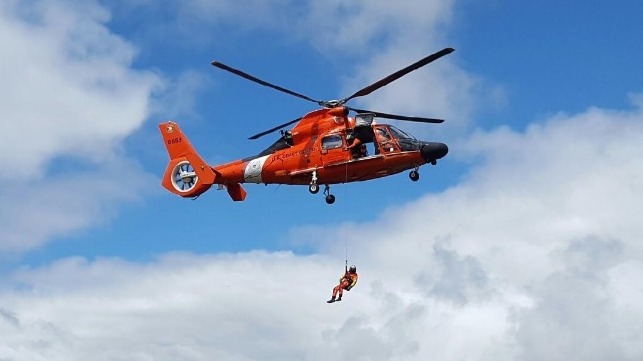U.S. Coast Guard Rescues Crew of Sinking Fishing Vessel off Coos Bay

The Coast Guard rescued five people from a life raft late Monday after a fishing boat sank about 20 miles offshore from the mouth of the Umpqua River, north of Coos Bay, Oregon.
The captain aboard the fishing vessel Desire made a distress call over VHF at about 2100 hours on Monday and told Coast Guard Sector North Bend that the vessel was taking on water. He also reported that the five crewmembers on board were preparing to abandon ship into a life raft.
In addition, the Desire’s registered emergency position indicating radio beacon (EPIRB) was activated by contact with water. The vessel’s location and owner information was transmitted to Coast Guard watchstanders at the 13th District Command Center in Seattle.
Rescue helicopter crews from the Coast Guard air stations in Newport and North Bend deployed to help the people in distress, along with motor lifeboat rescue crews from Coast Guard Stations Siuslaw River and Umpqua River.
At about 2130 hours, the helicopter crews located the survivors in the life raft and deployed rescue swimmers to facilitate hoisting them up. The helicopter crew from Newport rescued three survivors, and the helicopter crew from North Bend rescued the remaining two. The boatcrews remained on scene to assist as needed.
#CoastGuard rescues 5 from raft after fishing boat sinks 20 miles off #Oregon coast. No serious injuries reported. Preparation, EPIRB key to survival. Learn about EPIRBs: https://t.co/KiZ9SOmxkw#SAR pic.twitter.com/b3xSDZ7VyC
— USCGPacificNorthwest (@USCGPacificNW) November 16, 2021
Following the successful hoists of all five people from the life raft, the survivors were taken to Air Station North Bend, where they were transferred to awaiting emergency services personnel. There were no serious injuries reported.

that matters most
Get the latest maritime news delivered to your inbox daily.
"The fishing boat's crew all had survival suits, properly deployed their survival raft, and shot two flares to assist us in locating them," said Lt. Conor Regan, a helicopter pilot from Coast Guard Air Station North Bend. "Their overall preparation serves as an example for other mariners, as it was fundamental to the positive outcome of their potentially life-threatening situation."
Regan added that the EPIRB’s transmission was very useful, as it allowed watchstanders to confirm the details of the choppy radio distress call and speed up rescue coordination.
